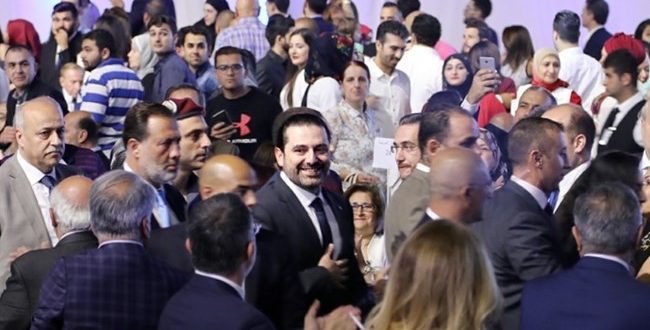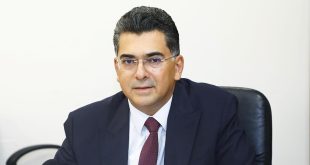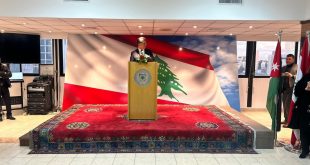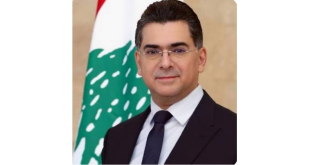Prime Minister Saad Hariri chaired a highly important meeting Tuesday night attended by senior officials of the country’s main political parties in the latest attempt to resolve sticking points that threaten to unravel a deal on a new vote law based on proportional representation.
The meeting at Hariri’s Beirut Downtown residence brought together Hussein Khalil, a senior aide to Hezbollah leader Sayyed Hasan Nasrallah, Finance Minister Ali Hasan Khalil, a top political aide to Speaker Nabih Berri, Foreign Minister Gebran Bassil – the leader of the Free Patriotic Movement – Lebanese Forces’ deputy chief MP George Adwan, and Nader Hariri, chief of the PM’s staff.
The meeting was billed “crucial” because the participants, pressed for time to avert a parliamentary vacuum, would seek to agree on the final version of the new proportional vote law agreement reached by President Michel Aoun, Berri and Hariri at Baabda Palace last week. The agreement calls for the adoption of a proportional voting system dividing Lebanon into 15 districts.
“The [delegates] will try to fine tune the final version of the new electoral law,” a source familiar with the negotiations told The Daily Star.
As The Daily Star went to press shortly after midnight Tuesday, no details of the meeting emerged and no statements were made.
Despite the sticking points, Hariri struck an upbeat note on endorsing the law. “We are working hard to wrap up the electoral law which, God willing, will be born within the next few days,” Hariri said in a speech during an iftar hosted by the Future Movement at the BIEL complex Tuesday night. “I reassure the Lebanese in this respect.”
The meeting at Hariri’s residence convened without the usual media coverage. It came on top of an intensified political activity to try and smooth the path for the endorsement of the law by the Cabinet and Parliament, an essential move that would clear the way for holding the first parliamentary elections since 2009 later this year.A final ratification of the new draft electoral law has become all the more urgent as Parliament’s mandate expires on June 20.
Earlier in the day, Hariri met with Ali Hasan Khalil at the Grand Serail with talks focusing on ways to iron out remaining wrinkles to replace the disputed 1960 winner-take-all system used in the last parliamentary elections.
Adwan also met with MP Walid Jumblatt, the leader of the Progressive Socialist Party, as part of his shuttle diplomacy between rival parties over the law.
Speaking to Al-Jadeed TV ahead of the meeting at the premier’s residence, Adwan said if an agreement was reached on the final version of the law, Hariri could call for an extraordinary Cabinet session Friday or Saturday to endorse the draft law and refer it to Parliament for ratification.
The Cabinet is set to meet under Hariri at the Grand Serail at 11 a.m. Wednesday with an ordinary agenda of 28 items excluding the electoral law draft, in a clear indication that some sticking points in the agreement have not yet been fixed.
Information Minister Melhem Riachi said Tuesday that the new vote law would not be discussed by the Cabinet.
NBN channel, which is affiliated with Berri, said in its evening news bulletin that discussions on the promised vote law have returned to square one after some media activists spread “a negative climate.”
Berri was reported to be opposing Bassil’s demand to link the vote law deal to a political agreement confirming parity between Muslims and Christians in a constitutional text and the creation of a senate as stipulated by the 1989 Taif Accord.
Referring to his package proposal during National Dialogue sessions he hosted at his Ain al-Tineh residence last year that called for an agreement on the election of a president, the shape of the new government and a new electoral law, Berri said in a statement released by his media office Tuesday: “You had rejected the package before the beginning to harvest [crops]. Why are you demanding it now since the time for harvesting is over?” He was apparently referring to Bassil who had rejected the package proposal.
Later Tuesday, Berri was quoted as telling visitors at his Ain al-Tineh residence that he had proposed the creation of a senate more than once since his meeting with Maronite Patriarch Beshara Rai in the Vatican in 2011 and later at the National Dialogue sessions in Baabda and in Ain al-Tineh.
Berri cited Article 22 in the Constitution, saying it states that with the “election of the first Parliament on a national, non-sectarian basis, a senate would be created in which all spiritual families would be represented and its prerogatives be confined to fateful issues.”
Taking an indirect swipe at Bassil, Berri said: “They are still demanding the shifting of a number of parliamentary seats and the amendment of the Constitution with regard to parity and the senate. Let the president, for instance, after the endorsement of the vote law, work to convene a dialogue and issue a political declaration dealing, for instance, with the senate and administrative decentralization.”
“Until kingdom come, we will not make Lebanon a sectarian [country]. Look what’s happening in the region. We are seeing what can be described as the beginning of its partition. Shall we undermine our country and follow this path?” Berri said.
The Future Movement’s parliamentary bloc stressed that the endorsement and implementation of the new vote law should be based on the Taif Accord and full respect of all provisions of the Constitution.
“The bloc is expecting the completion of efforts to finalize the full legal version of the new draft vote law and endorse it in the Cabinet and then refer the draft law to Parliament to study and ratify it, thus setting the stage for preparations for the electoral process,” the bloc said in a statement issued after its weekly meeting.
The FPM’s MP Ibrahim Kanaan reiterated the party’s demands for Muslims and Christian parity in the Constitution, the creation of a senate and endorsement of a new vote law. “The bloc’s stance has not changed. It supports an electoral law based on proportionality with constraints that ensure national partnership,” Kanaan said after the weekly meeting of the FPM’s parliamentary Change and Reform bloc chaired by Bassil. “The proposed guarantees and constraints begin with the senate and then the confirmation of parity in the Constitution.”
Kanaan called for parliamentary elections to be held in October, disputing with Interior Minister Nouhad Machnouk who was reported Monday to have suggested an almost 8-month technical extension of Parliament’s term to prepare for the implementation of the new law. “We support holding elections at the earliest time possible. We lean toward having them in October.”
Issues such as the percentage each candidate needs to win an electoral seat in any district, the preferential vote, the duration of a technical extension of Parliament’s term, the vote tallying procedures in a proportional system and granting Lebanese expatriates six parliamentary seats as demanded by the FPM could block the deal.
 Lebanese Ministry of Information
Lebanese Ministry of Information



